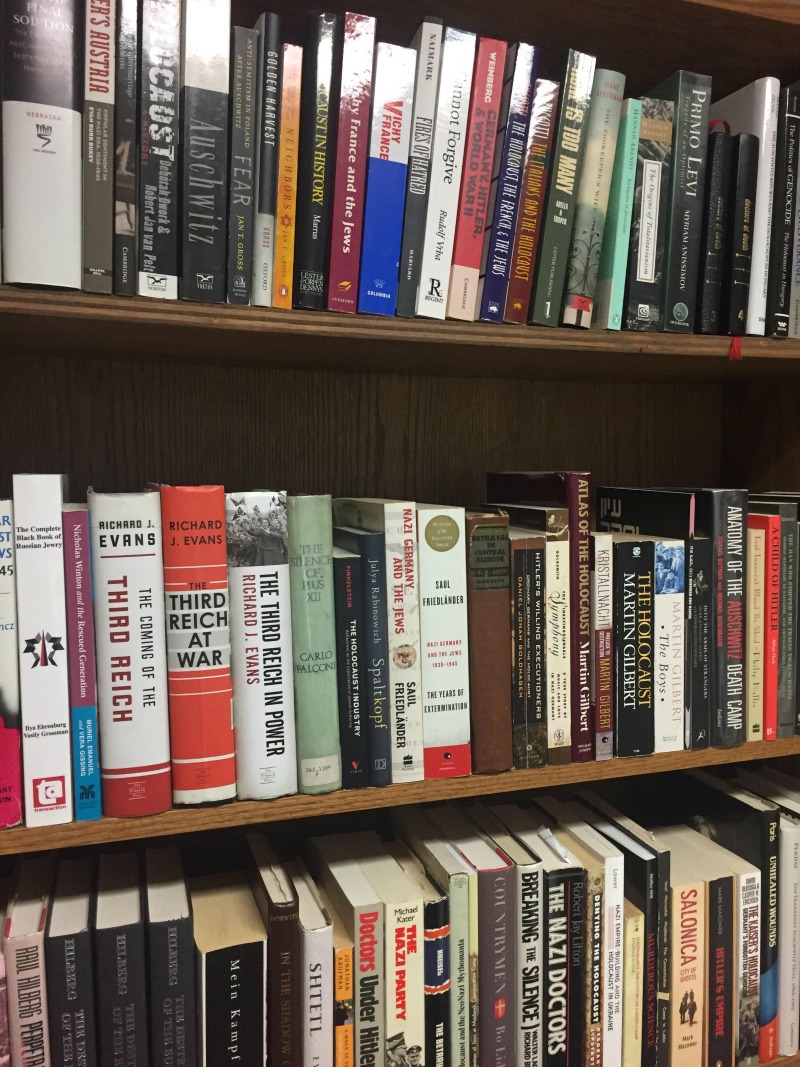
The Rudolf Vrba Holocaust Reading Room
The Wirth Institute for Austrian and Central European Studies is hosting its annual Jewish Studies Week on November 7-11, which brings to campus prominent scholars from around the world. Now in its second year, the event combines a number of annual traditions at the Wirth Institute, including the Toby and Saul Reichert Holocaust Lecture and the Tova Yedlin Lecture.
Established in 2003, the original Holocaust lecture series was the brainchild of physician and Holocaust committee member William Pearce and Franz Szabo, then-director of the Wirth Institute, as a means of preserving the memory of "the most painful and tragic wound in the history of the 20th century," says Szabo. Throughout the course of the series, Pearce accumulated a library of Holocaust-related materials, including first-hand accounts of survivors, which he donated to the Institute. TheRudolf Vrba Holocaust Reading Room made its debut during Jewish Studies Week in 2015.
The reading room is named after Holocaust survivorRudolf Vrba - an Auschwitz escapee, says Joe Patrouch, director of the Wirth Institute. Following Vrba's escape from Auschwitz in 1944, he co-wrote a report containing first-hand accounts of the atrocities taking place inside the camp. The 32-page Vrba-Wetzler report, was, according to The Guardian, "the first document about the Auschwitz death camp to reach the free world and to be accepted as credible." Vrba spoke at the University of Alberta in 2003 as the inaugural Holocaust lecturer. "He is the face of the lecture series," says Patrouch.
Vrba's lecture also inspired Saul Reichert, a successful businessman, and his wife Toby to make the lead gift toward the endowment of the Holocaust lecture series in 2005. Like Vrba, Reichert was a Holocaust survivor. During the war, his family was moved from the notorious Łódź Ghetto in Poland to Auschwitz-Birkenau, where 11-year-old Saul was separated from his mother and five sisters. He never saw them again. When the camp was liberated in 1945, Saul moved to Canada and settled in Edmonton.
The 2016 Toby & Saul Reichert Holocaust Lecture by Gordon J. Horwitz, Professor of History at Illinois Wesleyan University, takes place on Wednesday, November 9 at 5 p.m. in the Telus Centre Auditorium. "Between the Real and the Imagined, the Believable and the Unbelievable: Inside the Łódź Ghetto in the Terrible Summer of 1942" will examine the peculiarity of life inside the ghetto and the limits of the imagination in attempting to make sense of it.
The Reicherts' goal for the annual lecture, says Sylwia Adam-Ross, Executive Manager of the Wirth Institute, is to raise awareness of the Holocaust among the younger generations.
"To some extent, we have become desensitized," says Adam-Ross. "First-hand accounts are so powerful, and there are fewer and fewer people to tell the story. The donors reinforce this message every year - the younger generations haven't grown up with it the same way older generations have, so a reminder is very necessary."
The Tova Yedlin Lecture is different. Set up as a complement to the Holocaust lecture, the Yedlin Lecture focuses on Central and East European Jewry prior to the Holocaust.
As a young woman, Yedlin fled Poland just before the Nazis. In 1975, she became a professor of Slavic and Eastern European studies at the University of Alberta, one of only eight female professors at the time.Deborah Yedlin, Tova's daughter, launched the Tova Yedlin Lecture Series along with her husband Martin Molyneaux in 2009, in honour of her mother.
According to Adam-Ross, the Yedlin lecture tends to attract people with specific academic interests, such as faculty members and researchers, whereas the Reichert Holocaust lecture draws from Edmonton's Jewish community, as well as the university and high schools.
The 2016 Tova Yedlin Lecture features Lois Dubin, Professor of Religion from Smith College in Massachusetts, who will be discussing Rachele Morschene, one of the first European Jewish women to obtain a civil divorce. "One Jewish Woman, Two Husbands, Three Laws: Desperately Seeking Divorce and Marriage in Late 18th-century Trieste" takes place Monday, November 7 at 5 p.m. in L-1 Humanities Centre.
This year's Jewish Studies Week will also include a lecture by Michael Fisher -"The Holocaust in Europe: A Cartographic Journey" - in which the cartographer will discuss the Holocaust map he created for theinstitute in 2015. As Patrouch notes, Fisher's map resolves the difficulty of locating sites related to the Holocaust on modern maps with the inclusion of the borders that existed at the time. Fisher will be speaking on Tuesday, November 7 at 2 p.m. in the Senate Chamber in the Arts Building.
Adam-Ross says that the ultimate goal for Jewish Studies Week is to ensure a place at the University of Alberta for Jewish studies. Through the lecture series and the Holocaust Reading Room - now home to more than 250 books, films and archival documents - the level of awareness continues to grow. "Our institute represents seven countries, and all those countries have been touched by the Holocaust," says Adam-Ross. "All of them had Jewish populations. Without Jewish studies, it doesn't make much sense to study central European history."
The Wirth Institute's Jewish Studies Week is free and open to the public. For more information, please see the Wirth Institute website.
The Rudolf Vrba Holocaust Reading Room operating hours are: Monday - Friday, 9 a.m.-4 p.m. The collection is now searchableonline.